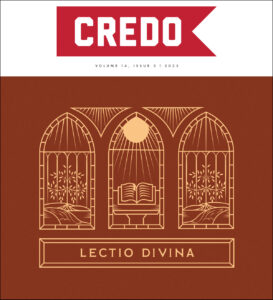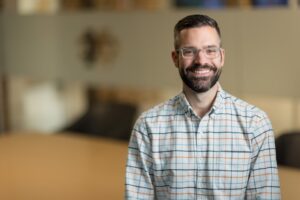
Lectio Divina: A Shepherd’s Guide
M ost of my work is centered around college students. I have worked directly with 18-22 year olds for the past thirteen years. There has been notable differences as the generation has shifted from the youngest Millennials to the oldest of Generation Z. Yet, one thing that has remained constant is their inexperience of how to regularly engage the Word of God in their daily life. In my particular circle the issues centers around an illiteracy of the Word, an ignorance on what to do with the Bible once they have it in front of them, and the problem of time. The practice of slowing down is making a resurgence among modern protestants through the work of pastors like John Mark Comer.[1] Most students, however, check their schedules and see very little space for practices that will produce holiness. If anything, they find a few minutes to open the Bible, find a few verses or follow their reading plan, quickly read, maybe write a few words of devotional content, pray quickly and earnestly for God to multiply their words and his favor, and then run to their next class. Unfortunately, the students whose field will soon be the ministry of the church are running at the same pace and reading in the same way.
ost of my work is centered around college students. I have worked directly with 18-22 year olds for the past thirteen years. There has been notable differences as the generation has shifted from the youngest Millennials to the oldest of Generation Z. Yet, one thing that has remained constant is their inexperience of how to regularly engage the Word of God in their daily life. In my particular circle the issues centers around an illiteracy of the Word, an ignorance on what to do with the Bible once they have it in front of them, and the problem of time. The practice of slowing down is making a resurgence among modern protestants through the work of pastors like John Mark Comer.[1] Most students, however, check their schedules and see very little space for practices that will produce holiness. If anything, they find a few minutes to open the Bible, find a few verses or follow their reading plan, quickly read, maybe write a few words of devotional content, pray quickly and earnestly for God to multiply their words and his favor, and then run to their next class. Unfortunately, the students whose field will soon be the ministry of the church are running at the same pace and reading in the same way.
Some problems need new solutions; others need practices that have stood the test of time and are almost as ancient as the text being read. Click To Tweet I have come to realize the problems listed above are not sequestered to a particular age group but are evident in most churches and across all age groups. The question then becomes how does a pastor shepherd his congregation to regularly engage the Holy Word slowly, deeply, and prayerfully? Some problems need new solutions; others need practices that have stood the test of time and are almost as ancient as the text being read. Eugene Peterson cites that the practice of Lectio Divina originates in the twelfth century with Guigo the Second, an Italian monk.[2] Evan Howard finds reference to the art of spiritual reading as far back as St. Benedict of the sixth century.[3] Either way, the discipline of Lectio Divina, the intentional practice of reading, meditating on, praying over, and contemplating the Scriptures is valid for the Church today. Peterson is helpful in distinguishing the difference between a “normal” or academic reading of the text and the reading of the Lectio. He states, “In spiritual reading we do not take control of the text, we let the text take control of us.”[4] Similarly, Howard believes the end goal of this type of reading is spiritual growth and the hope to bear fruit in the Christian.[5] By the sounds of it this reading of the text may be quite different than a cursory glance over a few verses and a short prayer.
The question then becomes: How does the pastor as shepherd guide his congregation through deeply experiencing the Word of God as a transformative collection of books that has the power not only to save the lost but also sustain the follower of Christ? I think this occurs in two movements. First, the pastor must practice before he preaches. Second, the pastor as shepherd educates, guides, and experiences the Lectio with his people.
Personal Before Public.
Leading people to engage disciplines should not begin until the pastor understands, agrees with, and has practiced the discipline himself. How can you teach on fasting if you have never felt the pain of hunger and been led to the Word of God to be spiritually filled instead of turning back to the temporary filling of food? How can you advise others to pray if you have not experienced the work of God in your own heart as you slowly but surely learn to pray as Christ modeled? The transfer of information will not aid in transformation like the transfer of experience. The transfer of information will not aid in transformation like the transfer of experience. Click To Tweet
Just as any preacher delivers his sermon throughout the week first to his own soul each day before he actually speaks into a public space; so should the practice of Lectio Divina occur. The personal formation through the use of this spiritual reading is paramount. The daily routine of reading, meditating, praying, and contemplating must be a rhythm before it becomes a recommendation. This is not to mandate that this practice cannot be suggested as you increase your own personal experience and practice of it. It is beneficial, however, to understand the exercise, the comforts and discomforts it may bring, and then move toward shepherding the church to be formed in this way.

